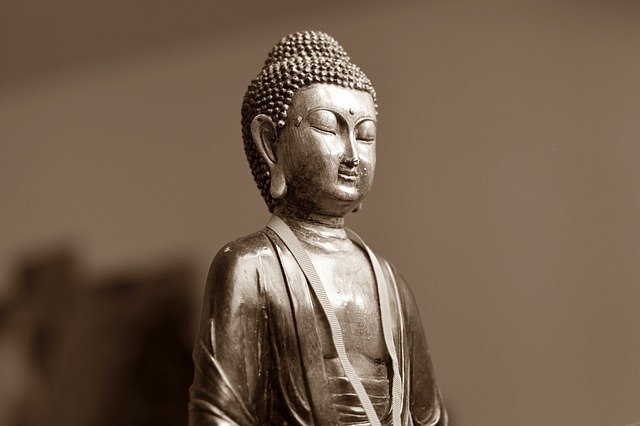Foreword
In this book of “Happy couple”, I have collected some things which should be useful to the wedding ceremony and also for the direction of those people who are interested in this matter. So they can take this information and contemplate if they are good husbands and wives.
Some of the problems in our present social life come from “Not being ready” for “couple-life” some couples think that marriage is only for fun and this attitude eventually turns to be the reason of increasing divorces.
It should be an advice to couples, who are willing to perform and cultivate ethic principles to create peace for their family and society.
May the Blessing of Dhamma be with you!
Veerananto Bhikkhu
Dhamma = Buddhist Teaching
The Happy Couple
May every couple be happy, a wedding day is the day a couple decides to life and share their live in good and bad times. In order to have good couple life or being husband and wife, the wife and husband should try to have proper behavior.
Forever being together must come from 4 Dhamma called Samajīvidhamma: qualities which make a couple well matched, they are as following:
1. Samma-saddhā: to be matched in faith. The Couple should have the same belief or religion and interest and if this is not so they should try to accept and honor the belief of the partner.
2. Sama-sīlā: to be matched in moral conduct. They should be able to practice a social behavior and moral conduct which is suitable for the social surrounding of the couple.
3. Sama-cāgā:to be matched in generosity. They should try to be equally generous to each other with devotion and ready to help others without hesitation or an aversive attitude.
4. Sama-paññā: to be matched in wisdom. Both should have equivalent intelligence or at least they should be able to talk together.
When the couple have all of these “Samajīvidhamma” it will be easy for them to stay together. They owe kindness, have similar personality and behavior, understand each other, and are helpful, compatible and patient.
Bhariyā: Seven types to wives
1. Vadhakā-bhariyā: a wife like a slayer; destructive wife. The wife who lives with her husband without goodwill, she always looks down upon her husband and tries to destroy him.
2. Corī-bhariyā: a wife like a robber; thievish wife. The wife, who acts like a thief, she always burns out all the existing properties and spends all the earning.
3. Ayyā-bhariyā: a wife like a mistress; Madam High and Mighty. The wife who is always lazy with the housework, nasty and has a “big mouth”, she is cruel and she behaves bossy towards her husband.
4. Mātā- bhariyā: a wife like a mother; motherly wife. A thoughtful wife who cares of her husband, she carefully handles all income and spends money reasonable and in accordance with their social level and she saves for future.
5. Bhaginī-bhariyā: a wife like a sister; sisterly wife. Being like a sister this wife always respects her husband; she is gentle and follows her husband in a proper and reasonable way.
6. Sakhī-bhariyā: a wife like a companion; friendly wife. The wife who is as a friend, she is always honest to him and makes him happy. She has good manner and character both in society and in private life.
7. Dāsī-bhariyā: a wife like a handmaid; slavish wife. The wife who is always under her husband no matter how bad she is treated by him, she bears all with patience.
The husband should always remind his wife, to realize what kind of wife she is and a husband should understand his own personality to see which kind of personality is compatible with his personality. This task needs moderation because our choices are usually not made with this consideration.
Sāmī : Seven types of husbands
1. Vadhakā-sāmī: A husband like a slayer. The husband who live with his wife in ill will. He always looks down on his wife and tries to destroy her.
2. Corī-sāmī: A husband like a thief. The husband who spends all the earnings and uses up all the properties.
3. Ayyā-sāmī: The husband who is too lazy to work, rude and nasty to his wife whenever he can and has ill manner.
4. Mātā-sāmī: A husband like a father. The husband who is always thoughtful and caring to his wife. Whatever he earns, he usually shares to her and he always puts aside savings for future.
5. Anujā-sāmī: A husband like a brother. The husband who loves and respects his wife like a sister, he is gentle, respectful and goes well along with his wife.
6. Sakhī-sāmī: A husband like a friend. The husband who lives with his wife like a friend with faith and honesty. He is always happy to meet her and he is polite with good manner and stays like that in every situation.
7. Dāsā- sāmī: A husband like a slave. The husband who allows her to be above or dominant, he is patient without anger.
A husband should know himself. What kind of husband he is and what should be improved to be the right husband.
Some ancient scholars also classified four other types of couples as such.
1 .A ghost husband with a ghost wife.
2. A ghost husband with an angle wife.
3. An angle husband with a ghost wife.
4. An angle husband with an angle wife.
Try to classify yourselves because there are these types of couples in our present society that sometimes can cause severe problems. Divorce and even murder can be the result of ill matched couples.
Gharāvāsa-dhamma
Virtues for a good household life; virtues for lay people
Faithful couples usually owe goodness and ethic principles which will help them to stay together for the rest of their lives.
There are four Gharāvāsa-dhamma which can be practiced by the couple at home to maintain their happy couple-life. These are the following:
1. Sacca: Truth and honesty. They should be honest and sincere to each other in thoughts, speech and deeds, in accordance to five situations.
1). duty
2). work
3). time
4). people
5). goodness
2. Dhamma: taming and training oneself; adjustment; self-development; mastery;
Training self-control and controlling emotions through calming the mind. Try to improve yourself and correct bad habits. Try to understand each other and adjust to each other.
There are 2 ways of calming:
1). Don’t let emotions grow
2). Calm down emotions which already arose
3. Khanti: tolerance; forbearance; perseverance
Being firm, stable and patient when your mate shows bad emotional behavior, do not react impulsive when conflicts arise, try to be enduring when difficulties and hardships arise. Try to be patient when hard work has to be done, move forward together. Be patient when pain, sorrow or temptations arise.
4. Cāga: liberality; generosity; sacrifice;
Being thoughtful, able to give up personal comfort for the sake of one’s partner (example when the partner is sick, you should nurse your partner even if you do not get enough sleep) also being kind and generous, giving in charity to the relatives and friends of one’s partner.
They are 2 types of Cāga.
1) Material charity
2) Emotional charity
The couple which is sharing this four Gharāvāsa-dhamma and maintains these four, will be able to stay together in peace, harmony and happiness. This marriage can be compared to a house which has four posts.
The couple sharing responsibility
The couple which is sharing responsibility helps and serves each other in accordance to the following teachings:
A husband serves his wife by:
In five ways a husband should serve his wife:
1) by honoring her with her status as his wife.
2) by being courteous to her not disparaging her
3) by being faithful to her; not committing adultery.
4) by handing over authority to her; giving her control of household concerns.
5) by providing her with ornaments; giving her occasional gifts of ornaments and clothing .
A wife honors her husbands by:
In five ways a wife, serves and shows her love for her husband:
1) She manages household affairs in a good and correct way
2) She is hospitable and helpful to friends and relations of both hers and his.
3) She should be faithful to him; not committing adultery.
4) She should take care of the goods he brings home.
5) She should be skilful and industrious in all her duties.
As you see both – wife and husband have the duty to always be careful and have consideration with the family. If they follow this duties, there will be a harmonious family live.
Sorrow of woman
A sympathetic woman: There are a number of conditions peculiar to a woman about which a husband should be considerate and to which he should respond with care and sympathy. These problems are the following:
1. She must be parted from her kin or her family despite her young age to live with her husband’s family: The husband should treat her with kindness, warmth and make her feel at home.
2. She has a monthly period; which sometimes causes changes in her physical and mental states: the husband needs to understand this.
3. She may need special care and attention, both physical and mental when she is pregnant.
4. When she has to give birth, which is an extremely painful and even life-threatening time; the husband should look after his wife as if her suffering were his own.
5. She must submit to the wants of her husband: the husband should not do just as he pleases, but appreciate her attention and respond to it thoughtfully.
Gihisukha:Happiness
Gihisukha: householders’ happiness; deserved bliss of a layperson
1. Atthisukha: bliss of ownership; happiness resulting from economic security. Happiness and pride arises if someone contemplates that one spends the money, which one has earned legally. Money should be spent in the following way:
1) to entertain friends
2) to cure any danger
3) for social ceremony
4) for devotion
5) to make a living, to look after parents, children, wife, husband and followers.
2. Bhogasukha: bliss of enjoyment; enjoyment of wealth; happiness arising from spending money and consuming one’s wealth.
3. Ananasukha: bliss arising from the knowledge that one is without debt;
4. Anavajjasukha: bliss of blamelessness; happiness on account of leading a faultless life.
From all of this happiness, Anavajjasukha is the worthiest because proper behavior can bring all happiness. On the other side, ill behavior can spoil the happiness and it is the cause of going down. So if one is careless and does not cultivate ethic principles it will cause problems in family and society.
Development and progress in modern society may cause problems for society and family live, so one always has to check if these things are in conformity with ethic principles.
To ensure the harmony and prosperity of one’s family one should consider the following four Kula-ciratthiti-dhamma.
Kula-ciratthiti-dhamma:
Causes for lasting wealth in ones family
1. Natthagavesanā: seeking for what is lost; when things are lost or used up, he replenishes them.
2. Jinnapatisankharanā: repairing what is worn out; when things are old and damaged, he restores and repairs them.
3. Parimitapānabhojanā: moderation in spending; he knows moderation in eating and using.
4. Adhipaccasīlavantathāpanā: putting in authority a virtuous woman or man; he places a moral and virtuous woman or man in charge of the household.
One should understand what the causes for a successful, harmonious family live are. And one should know that practicing the opposite will cause the ruin of a family.
May all those who decide to live a couple-live realize what is beneficial and stay away from all kind of practices which destroy the happiness of their family-live.
Finally may you life in harmony and happiness for the rest of your lives.
Charoenporn (Blessing)
In the Dhamma house The Buddhist Saint will come to birth
In the pleasant house The Brahma will come to birth
In the innocent house The human being will come to birth
In the clever house The scholar will come to birth
In the duty house The hell’s beast will come to birth
In the gambling house The wicked man will come to birth
In the confuse house The Ogre will come to birth
In the gangster’s house The animal will come to birth
In the drunken house The foolish man will come to birth
In the mad pill-taking house The mad man will come to birth
In the beau man house The pig’s soul will come to birth (Enemies will come)
In the thinner inhale house The silly man will come to birth
In the Rampage house The Neurotic man will come to birth
In the scolder, gossip house The dog’s soul will come to birth (I apologize)
Shell’s holy water
Blessing the golden ship of life
Travel as smooth as thought
Fulfilled with love, Forgiveness and Understanding
The couple will be happy forever.
Buddhist monk sprinkle the shell’s holy water
“Itung Utagung Viya Songsottha Apechcha Hotha”
That means:
May you both live together
Like the river clean and bright
The river runs without break and apparition
May your both hearts like the river flow.



